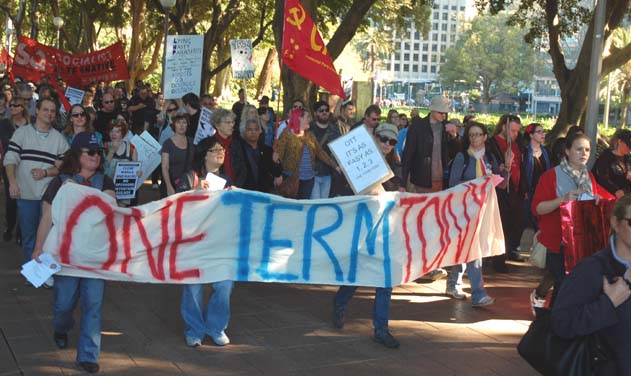Tony Abbott has signally failed to win support for his budget—either from the public or from the Senate. One year into its term in office, Abbott’s government has now defined itself as unfair and untrustworthy.
There remains serious doubt on whether Abbott can get key measures like the $7 GP fee, university fee deregulation, cutting under 30s off unemployment benefits or increasing the pension age, through the Senate.
The budget measures have not yet been knocked out, with negotiations behind the scenes with Clive Palmer and the other Senators continuing.
Yet far too many of Abbott’s opponents seem prepared to let the fight against the budget peter out. March in August, the latest round of budget rallies, was a success with around 3000 demonstrating in Sydney and 5000 in Melbourne. But numbers were clearly down on the March in May or the Bust the Budget rallies. The student National Day of Action at the end of August, too, was far smaller than the immediate post-budget rally.
Some people perhaps complacently believe that the Senate will do the work for us—and hope that Clive Palmer’s opposition to Abbott’s key budget measures holds up. However Palmer’s voting record since he took possession of the balance of power in the Senate suggests that he is willing to compromise and strike deals.
But the main reason for the shape of the anti-budget campaign is that the key voices opposing the budget have not put forward a strategy for stopping Abbott from passing his attacks into law. They are content to wait until the next election in the hope of voting Abbott out.
The March Australia rallies have been a fantastic expression of the scale of anger that exists against Abbott’s government.
But March in August was simply built around the slogan “rally for a better government”, without any argument as to how this could be achieved. This means it dovetailed with the arguments of Labor and The Greens, who say that we have to wait until the next election to vote Abbott out. But by then some of Abbott’s worst budget attacks could already be in place. And we can’t rely on a future Labor government to reverse them.
Labor never reversed the bulk of WorkChoices, let alone John Howard’s earlier anti-union laws. Labor never reversed the cuts to corporate tax that have reduced the government’s ability to pay for services. And it brought back his anti-refugee policies.
Union response
The ACTU has focused on organising an email campaign to lobby Senators, with the implication that this is the only way we can hope to stop Abbott’s attacks.
After calling one weekend of “Bust the Budget” rallies nationwide, the unions have backed away from organising demonstrations against Abbott. There were only a handful of unions that made any serious effort to get members to the March in August rallies. The ACTU has called off a national day of action against the budget planned for 23 October.
Unions in Victoria, NSW and Queensland have shifted their focus from the budget to the state elections due in November and March respectively. There is no reason that the state elections should mean mobilising against Abbott’s budget is a distraction. There is a clear link between Abbott’s cuts to hospitals and schools, and his push for privatisation at a state level, and the state Liberal governments helping to carry this out. But because the union peak bodies are focused on electoral work door knocking and targeting marginal electorates, they can’t see this.
To increase the pressure on Abbott we need a much stronger grassroots campaign. In 2005 the unions brought out half a million people nation-wide in stopwork rallies and protests against John Howard’s WorkChoices—far larger numbers than in any of the anti-Abbott actions so far. This kind of action would give the budget campaign real momentum.
All-out mass demonstrations and serious union strike action against the budget now could increase the political crisis for Abbott through costing big business millions in lost profits.
A major campaign could put serious pressure on the whole Senate, including Labor and The Greens, to refuse to pass any more of Abbott’s attacks. The calls to “block the budget” completely need to be revived—and to grow stronger as Abbott’s next budget approaches. The inability to get its agenda through could create an impasse for the government big enough to force Abbott to resign, or to call a new election.
We need to use whatever opportunities exist—from the campaign to Save Medicare, to union delegates meetings and conferences—to keep up the fight and build pressure for action on union leaders, Labor and The Greens.
By James Supple




